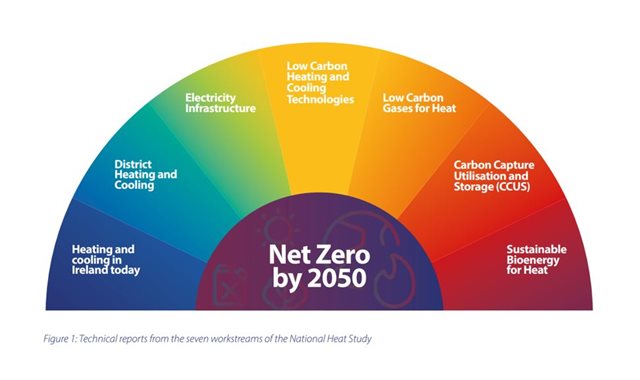
Date: 17 Nov 2022
Introduction of an obligation on the heat sector by 2024
The Minister for the Environment, Climate and Communications, Eamon Ryan, will introduce an obligation on the heat sector to include renewable heat by 2024.
Ireland’s renewable energy share in the heat sector last year was 6.8%, compared to the European Union average of 22%. While progress is being made, with an increase of half a percentage point on the previous year, significant action is needed to transform our energy sector to a high-renewable, low-carbon system on a pathway to net zero emissions by 2050.
Several policy measures aimed at decarbonising the heat sector have already been implemented. Building regulations have been updated and a share of the energy demand in new buildings now comes from renewable sources. The provision of incentives, such as SEAI’s residential and community energy efficiency upgrade schemes, support domestic heat users to increase the energy efficiency of Ireland’s housing stock. In addition, the Support Scheme for Renewable Heat offers supports for the adoption of renewable heat systems by non-domestic heat users.
In line with the recent agreement on Sectoral Emissions Ceilings to deliver up to 5.7TWh of biomethane to further accelerate the reduction of overall economy-wide emissions, the government has agreed to introduce an obligation on the heat sector to include renewable heat by 2024. The obligation will further incentivise suppliers of all fuels in the heat sector to ensure that a certain proportion of the energy supplied is renewable.
Sustainability must remain a key consideration as Ireland looks to change the way we source our energy. The design of policies will focus on the need to avoid negatively impacting on biodiversity, land use and food security.
The Department of the Environment, Climate and Communications will now carry out a scoping exercise to develop options for the proposed structure of the scheme. This process will include examination of proposed obligation rates, scalability, and costs to the consumer. It is intended that a technical consultation will then be undertaken in Q1 2023, to directly inform the final design of the scheme.
National Heat Study
The National Heat Study, published by the Sustainable Energy Authority of Ireland (SEAI) in February 2022, is a comprehensive analysis of the options for reaching net zero emissions from the heating sector by 2050 and contains detailed analysis which will now facilitate the development of options, policies, and measures to decarbonise the heating and cooling sectors to 2050.
The study comprises of a series of technical reports analysing heat use and supply across all sectors. It explores potential pathways for decarbonising heat energy use. The study provides new insights and proposes actions that should be taken, to turn around rising emissions from this sector.
In its examination of Low Carbon Gases for Heat, the National Heat Study presents information on gas usage in Ireland today and how this demand may be met by low carbon gases in future. The study estimates the costs of various production methods of hydrogen and biomethane and discusses several potential trajectories for how the gas transmission and distribution networks may change over the years to 2050.
Some key insights in the National Heat Study are as follows:
- Heat-related CO2 emissions are rising
- Ireland aims to cut economy-wide emissions by 51% from 2018 levels by 2030. The current Climate Action Plan measures are unlikely to deliver enough heat-related CO2 cuts to meet a proportional share
- Evolving existing policy supports to focus on replacing fossil fuels in buildings can have a more significant and immediate emissions reduction impact than a fabric-first approach
- Nationally appropriate sustainability governance is required to minimise upstream emissions, align with circular and bioeconomy goals, and avoid increasing emissions in nonenergy sectors
- Net-zero emission pathways with the lowest cumulative emissions use more electric heating technologies. Scenarios focused on a hydrogen gas grid have more cumulative emissions
- A timetable for fossil fuel phase-out in all sectors is needed as soon as possible to meet net zero by 2050
- The availability of sustainable biomethane is linked to land-use choices and requires increased productivity in the agricultural sector. It can be a competitive option if the costs and benefits are shared across all gas grid users or used off-grid to displace oil
The actions from the National Heat Study are explored across three categories: actions that can be taken now; technology pathways that require decisions now; and action to be investigated further to support the next wave of policy effort.
New fossil fuel demand makes the challenge of reducing emissions by 51% much more difficult. Approximately 3950GWh of new gas demand was connected from 2017 to 2021 (circa 45,000 connections), with 843GWh (6,200 connections) in 2021 along. This data is from SEAI.
Among the actions identified in the Heat Study that can be taken now to contribute to our decarbonisation targets is the development of policy frameworks that allow the costs and benefits of renewable and low-carbon gases to be shared across all gas customers and to enable off-grid heat users that currently use higher-cost and higher-carbon fossil fuels to access biomethane outside of the grid.